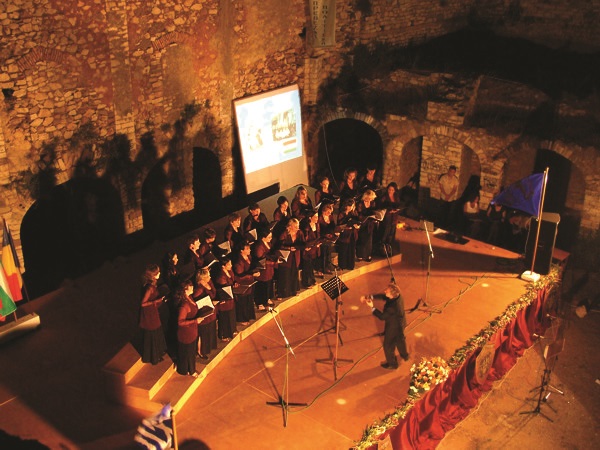Olga Alexopoulou, conductor
In modern Greece, newly formed as a state in 1830, choral music was not a part of the folk or classical music tradition. With the exception of the pentatonic polyphony of Epirus and the Italian influence found in the Heptanese and Crete (due to these areas being under Venetian rule), in the rest of Greece we encounter monophonic and antiphonic singing.
The concept of a choir therefore (beyond any origins we can find in the dance of the chorus in ancient Greek drama) is a somewhat acquired one. The first attempts at forming choirs were mostly made either by foreigners visiting Greece or by individuals of such social standing that they had the opportunity to come into contact with the European music scene. An example of this is the invitation by Queen Olga extended to A. Katakouzinos from Odessa in 1870 to found the palace chapel choir. In the 1896 Olympic Games the hymn by Samaras was performed under the direction of M. Uger, and in 1916 A. Marsick formed the first women’s choir.
The first amateur groups soon began to make an appearance all over the country. An indicative example is that of the choir of Tripoli around 1930, conducted by Saliveros – a cooper by profession. Many years would pass before a more thorough look was given to this increasingly popular genre.
1980-2008
In the early 1980s there was an unprecedented increase in the number of choirs. Every municipality formed at least one amateur choir (an activity usually offered for free). In this way an incredible number of people came into contact with this kind of music. Automatically there were employment opportunities for conductors, choristers and pianists. Due to the lack of specialization, many amateur musicians – in possession of some general musical education – undertook the conducting of choirs but without any detailed knowledge of the art. This led to the cultivation of the mistaken impression (which functioned as a barrier for many years) that anyone with some involvement in music can become a conductor.
The need for more systematic training and in-depth understanding of the parameters of the art began to become apparent. Yet for many years the number of people pursuing further study in the field was small. A relevant law for the founding of a school for choir conducting existed, but the school could not function, in part due to the lack of specialized professors and instructors, but mainly because the legislative regulations concerning the diploma examinations did not exist. This resulted in some individuals deciding to pursue relevant studies abroad, such as A. Kontogeorgiou, M. Patseas, F. Papakonstantinou and R. Mastrosavva. On their return, they established choir conducting departments in already existing conservatories.
Antonis Kontogeorgiou was the first to create a three-year course for choir conducting, graduates of which in turn went on to have remarkable careers not only as conductors but also as leaders in the study and resolution of organizational and institutional problems that existed in Greek music education (K. Th. Evangelatos, St. Oulkeroglou, M. Logiades, etc.).
The prevalent mentality held that taking part as a chorister in a good ensemble and making detailed observation of a good conductor, in combination with some general knowledge of music, was sufficient qualification for assuming the role of a choir conductor. An important factor which contributed to changing this mentality was the organizing/existence of the many and varied International Choir Festivals (Tripoli, Kifissia, Atalanti, Larissa, Kefalonia etc.) and competitions which blossomed during these decades (Athens International Choral Festival, International Competition for Sacred Music in Preveza etc.) Contact with foreign choirs and conductors, as well as the introduction of an increasingly demanding repertoire, gradually cultivated the need for qualified conductors.
For many years the basic way of training conductors was through seminars. Even today, workshops, speeches, meetings with conductors invited from abroad, summer camps and symposia, flourish. During the 1990s, with the collapse of the former soviet regime, Greece received a wave of immigrant artists from countries with remarkable music academies and a good level of musical studies, such as Albania, Bulgaria, Yugoslavia, Russia, Belarus and the Ukraine. Their incorporation into Greek society, as violinists, pianists and conductors for example, made obvious the difference between systematic education and occasional training.
These processes helped Greek musical life slowly mature. One priority of the new generation of conductors is the development of their abilities and the deepening of their knowledge in the field. They have been convinced by their complex, long-term and at the same time fascinating, area of study.
In 2007, the Ministry of Culture ‘solved’ the problem by founding departments of choir conducting with a defined program of study in music Conservatories, as well as programs of postgraduate studies in the Music University of Corfu. There are still many institutional problems in the functioning of these departments, but a start has been made. Since October 2008, the first departments have been officially functioning in some music conservatories and in the music departments of some universities.
 Olga Alexopoulou, conductor, Vice President of the Pan-Hellenic Association of Conductors of Choral & Instrumental Ensembles
Olga Alexopoulou, conductor, Vice President of the Pan-Hellenic Association of Conductors of Choral & Instrumental Ensembles
Edited by Sue-Ann Struwe, South Africa

